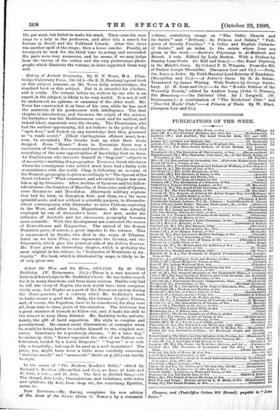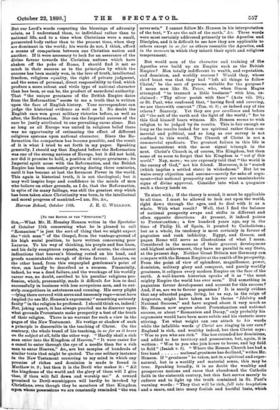(Blackwood? 2/6 Maclure (J. G.), Possibilities, cr 8vo (Marshall Brothers)
2/4 Lubovins (L.), Progressive German Composition, 12nio
MacMnychy (A. K.). The Epistle of St. Paul to Philemon, 8vo (Oliphant) 3/6
(Lawrence & Sullen) 2110
Meade (G. T.), Tbe Girls of St. Wode's, or 8vo ami 63,/06 Maeterlinck (K.),, Wisdom and Destiny, or 8vo lli. Allietnh
Maude (E.), Belinda, and Some Others, cr 8yo Arrow Maxwell (H.), Salmon and Sea Trout. MG
Meyer (E. St.), A Practical Dictionary of Cookery, roy Svo (Thnibe Murray)ar 5/0 2/6 blookhouse (A.), A. Deliverance. cr 8vo (.1. Murray)261
Mivart frit. GA, The Groundwork of Science, or 8vo Mock er (G.), The Girls ot St. Semi's, cr goo Molesworth (Mrs ), The Laurel Walk, or 8v0 Belch (R ), Tbe Others, by One of Them, or 8vo (Lane) 3/6
Rallies (H. St. J.?, The Life and Letters of H. 0. Raikes, 8.0 (..A(Mr"(aii8vec:(ti'wniinlidelelkiaavetinhe;))); 1063366///11':100.6
Morris (O'C.), The Great Campriiins of Nelson, or 8vo Parker (G.). The Rattle of the Strong, or 8vo Peader (Mrs. M. T.), Tee G, en Cockade, or Ma
Plaistowe (P. G.), The Tutorial Lion Dicsioaary, imp. 16mo Bendel (0. G.), Newcastle-on-Tyne: its Municipal Origin and Growth, cr bye Robertson (J.), The Poetry and the Religion of the Psalms, 8vo (BlatAkrooldt) 12306 Seymour I W. W.). The Cr oss : its Tradition, history, and Arl... ..1(MPeut:bnLiemw"))) 34137
lineves (M.). Dutch Painters of the Nieeteenth fletitury,4to
Rielly (W. Cl,), A Vendetta of the Desert, or 8yo bhaylor (J.), The Pleasures of Literature and the Bolas, of Books, S, Iona, (13.), Beat. to Coventry, or 8vo
Transactions and Proeeedings of Seoond International Library Oonferenne
(Wells Gardner) 2536//0/60
(Arnuldl 12/d limo Polly (H. R.), Life of Henry kt irley, 8vo in London, July, 1897, 4to Tyrrell (3.), Hans :saying., ow 13.0 Upton (S. and F.), The Golliwog at the Bea-side, obl 4to Van Dyke (J. C.), Nature toe its own S dor. or 8vo Various Quills : Selections in Prole and Verse, cr 8vo
Weymaa (S. J.), The Castle Inn, or 8vo White IR.), The Island of Seven Slinclows, or 8vo With Fite and Drum : Stories, edited by A. H. Miles, or 8vo (Hutchinson)3,/6 Young (0.), The Shark-Hunter, or 8,0 (Chapman) NO
(Longman's) ./2
(Longmans) 6/0 (Low) 7/6 (Arnold) 5/0 (Smith & Elder) 6/0 (Dines/ 6/0
Mat our Lord's words respecting the blessings of adversity relate, as I understand them, to individual rather than to national life, and to a time when Christians were a small, ,persecuted body rather than to the present time, when they are dominant in the world ; his words do not, I think, afford a means of comparison between one Christian nation and another. If it were necessary to look for an assurance of the divine favour towards the Christian nations which have shaken off the yoke of Rome, I should find it not so -much in their success as in the principles by which the success has been mainly won, in the love of truth, intellectual freedom, religious equality, the right of private judgment, and the sense of personal, direct responsibility to God, which produce a more robust and virile type of national character than has been, or can be, the product of sacerdotal authority. 'That "the unique greatness of the British Empire dates -from the Reformation" seems to me a truth that is written -npon the face of English history. Your correspondent can judge the historical evidence as well as I. No doubt the English race won great military victories before, as well as -after, the Reformation. Nor can the Imperial success of the race be justly attributed to one prevailing cause alone. But so long as all Europe was united in religious belief there was no opportunity of estimating the effect of different religious systems upon national character. Since the Re- formation the comparison has become possible, and the result of it is what I tried to set forth in my paper. Speaking generally, I should say that England before the Reformation was one of the strong nations of Europe, but it did not hold, nor did it promise to hold, a position of unique greatness ; its Imperial spirit arose with the Reformation, and the British Empire has been constantly growing during three centuries, until it has become at last the foremost Power in the world. This again is historical truth, it is not theological; but it may well inspire hope and confidence in the minds of men who believe on other grounds, as I do, that the Reformation, in spite of its many failings, was still the greatest step which has been taken since Christianity was born, in the intellectual and moral progress of mankind.—I am, Sir, &c., Harrow School, October 19th. J. E. C. WELLDON.
ETO THE EDITOR OY THE " SPECTATOR:1 SIR,—What Mr. H. Hensley Henson writes in the Spectator of October 15th concerning what he is pleased to call -"Romanism" is just the sort of thing that we might expect the "rich man" of the Gospel, from the vantage-ground of Ids high social position, to have written concerning poor Lazarus. To his way of thinking, his purple and fine linen, and his daily sumptuous repasts, were, of course, the clearest indications that heaven's blessing rested on his head, and proofs unmistakable enough of divine favour. Lazarus, on the other hand, from this empurpled gentleman's point of view, can hardly be described as a success. Financially, indeed, he was a dead failure, and the wreckage of his worldly career was, no doubt, ascribed to his peculiar religious pro- fession, which, presumably, made it difficult for him to deal successfully in business with less scrupulous men, and to out- .strip competitors in astuteness and cunning. His sorry plight —lying there covered with sores and unseemly rags—must have implied (to use Mr. Henson's expression) " something seriously faulty" in the religion he professed. I should think so, indeed But, joking apart, it has always puzzled me to discover upon what grounds Protestants make prosperity a test of the truth of their religion. There is no warrant for such a view in the pages of the New Testament. No vestige or shadow of such a principle is discernible in the teaching of Christ. On the oontrary, the whole trend of his teaching, in so far as it bears on the subject at all, tells the other way. "Hardly shall a rich man enter into the Kingdom of Heaven," "It were easier for a camel to enter through the eye of a needle than for a rich man to enter Heaven," &c., are but samples of hundreds of similar texts that might be quoted. The one solitary instance in the New Testament occurring to my mind in which any promise of riches and dominion is made is found in Matthew iv. 9; but then it is the Devil who makes it : "All the kingdoms of the world and the glory of them will I give -thee, if thou wilt fall down and worship me." A reward promised to Devil-worshippers will hardly be invoked by Christians, even though they be members of that Kingdom upon whose possessions we are constantly reminded "the sun
never sets." I cannot follow Mr. Henson in his interpretation of the text, "Ye are the salt of the earth," &c. These words were most certainly addressed primarily to the Apostles and Disciples, and it is difficult to see how they are applicable to others except in so far as others resemble the Apostles, and in the measure in which they inherit their spirit and religions temperament.
But would men of the character and training of the Apostles ever build up an Empire such as the British Empire ? Men totally indifferent to wealth, and reputation, and dominion, and worldly success ? Would they, whose chief boast was that they had "left all things to follow Christ," be the sort of persons suitable for the purpose ? I mean men like St. Peter, who, when Simon Magus attempted "to transact a little business" with him, ex- claimed : "Thy silver perish with thee" (Acts viii. 20); or St. Paul, who confessed that, "having food and covering, we are therewith content" (Tim. vi. 8) ; or indeed any of the others ? Scarcely. Yet they are par excellence and before all "the salt of the earth and the light of the world ; " for to this God himself bears witness. Mr. Henson seems to wish religion to be judged by its results. This is fair enough so long as the results looked for are spiritual rather than com- mercial and political, and so long as our survey is not confined to this world. The Church of Christ is not a commercial syndicate. The greatest failure in this life is not inconsistent with the most signal triumph in the next. Christ's Church is, of course, His Kingdom, but then some of us seem to forget that his Kingdom is "not of this world." Nay, more ; we are expressly told that "the world is the enemy of God," not his friend. Moreover, it is "seated (which implies a settled state) in wickedness." But let us waive every objection and assume—merely for sake of argu- ment—that national prosperity and power are unmistakable signs of divine approval. Consider into what a quagmire such a theory lands us.
To start with ; if the theory is sound, it must be applicable to all time. I must be allowed to look out upon the world, right dowa through the ages, and to deal with it as a whole. With what result? Well, that I find the balance of national prosperity sways and shifts in different and often opposite directions. At present, it indeed points to Protestantism ; a few hundred years ago, say in the time of Philip II. of Spain, it pointed to Catholicism; but as a whole, its tendency is most certainly in favour of paganism and rank infidelity. Egypt, and Greece, and pagan Rome will serve as illustrations of what I mean. Considered in the moment of their greatest development and highest achievement, they have no parallel in any State, at the present day. Neither Great Britain nor Germany can compare with the Roman Empire at the zenith of its prosperity. From the point of view of splendour, magnificence, power, dominion, military glory and conquest, and purely worldly greatness, it eclipses every modern Empire on the face of the earth. A well-known historian speaks of it as "the most mighty Empire the world has ever seen." Did something in paganism favour development and account for this success ? And, if so, are we to favour paganism ? It is surely evident that any educated pagan, living, let us say, in the reign of Augustus, might have taken as his theme "Idolatry and National Success," and have argued about it very much as Mr. Henson now argues about Protestantism and national success, or about " Romauism and Decay," only probably his arguments would have been more subtle and his rhetoric more stirring. Yet what weight can one attach to his words while the infallible words of Christ are ringing in our ears ? England is rich, and wealthy indeed, but then Christ says : "Woe to you who are rich." She has extended her dominions, and added to her territory and possessions, but, again, it is written : "Woe to you who join house to house, and lay field to field" (Isaiah v. 8). "Where the Roman Church has bad a











































 Previous page
Previous page